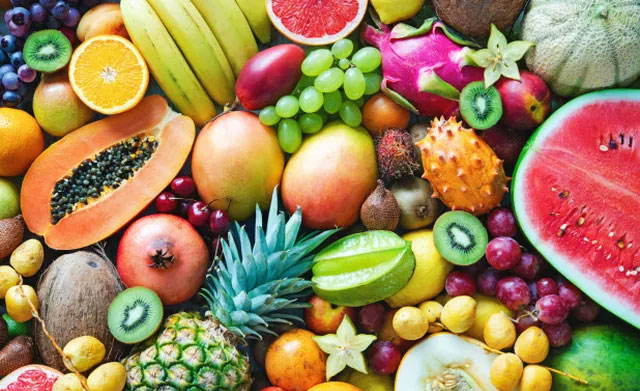What fruits should cancer patients eat?
Certain foods, including fruits that contain health-promoting compounds, can slow tumor growth and reduce certain side effects of treatment that make it easier for cancer patients to recover.
Diet can affect the risk of developing cancer. Similarly, if you are being treated or recovering from cancer, it's important to have a healthy food diet.
When treating or recovering from cancer treatment, choosing the right fruit is important.
Cancer treatments like chemotherapy and radiation cause lots of side effects. Which foods you eat or drink can make them worse or improve.

Diet can affect the risk of developing cancer.
Common side effects of chemotherapy and radiation include: fatigue, anemia, nausea, vomiting, taste changes, diarrhea, constipation, painful swallowing, dry mouth, mouth ulcers, mood changes, etc.
So during cancer treatment, you need a diet with nutritious foods, including fruits that provide vitamins, minerals and antioxidants.
However, it is important that you choose the right fruit for your specific disease symptoms.
For example, a fruit smoothie is a good option if you have trouble swallowing. While fiber-rich fruits are great if you are constipated.
You may also want to avoid certain fruits based on disease symptoms. For example, citrus fruits can irritate mouth ulcers and worsen dry mouth.
Fruits like apples, pears, and apricots are difficult for cancer patients to eat if they have mouth ulcers, difficulty swallowing, dry mouth or nausea.
For some people with memory and concentration problems, blueberries, grapefruit, pomegranates, etc. can be added to your daily diet. One small study found that drinking blueberry juice daily for 12 weeks improved memory and concentration in older adults. Although these studies do not include people undergoing cancer treatment, these findings still apply.
A study of 24 adults also found that drinking 500ml of citrus fruit juice, including grapefruit, helps increase blood flow to the brain, which can help reduce impairment and attention deficit caused by chemotherapy.
Another small study also showed that drinking 237ml of pomegranate juice daily for 4 weeks increased brain activity and improved memory. Furthermore, animal studies have found that pomegranates can help relieve joint pain, another common side effect of cancer treatments like chemotherapy.
To help patients fight anemia, a common side effect of chemotherapy, cancer patients can eat oranges. Vitamin C from oranges can also enhance the absorption of iron from foods.
Research shows that vitamin C can reduce the growth and spread of cancer cells and act as a therapy against certain types of cancer.
Other test-tube and animal studies suggest that raspberries may help boost memory, potentially preventing some of the side effects of chemotherapy.
- Nutrition for people with biliary tract and gallbladder cancer
- Diet for people with throat cancer
- 5 tips to help cancer patients stay healthy
- Why does cancer increase rapidly in Vietnam?
- 7 kinds of summer vegetables against cancer
- How does cancer people exercise to repel disease?
- The blood cells of cancer survivors have hope to help other patients' get better.
- Peaches and plums are resistant to breast cancer
- Patients with lung cancer metastasize throughout the body still cured
- Aspirin prolongs the life of bowel cancer patients
- Diet for throat cancer patients
- Fish oil benefits for bowel cancer patients
- Development of a new immunity against cancer from the royal tree
- This color granule can prevent skin cancer
 Why is Australia the country with the highest cancer rate in the world while Vietnam ranks 100th?
Why is Australia the country with the highest cancer rate in the world while Vietnam ranks 100th? New drug causes cancer to 'starve'
New drug causes cancer to 'starve' Common cancers in men
Common cancers in men America's incredible discovery: The most feared cancer cell is love
America's incredible discovery: The most feared cancer cell is love